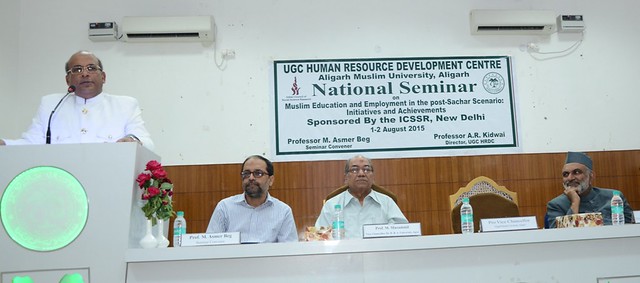By TCN News,
Aligarh: The Aligarh Muslim University (AMU) Pro Vice Chancellor Brigadier S Ahmad Ali (Retd) has said India’s development is not possible without the progress of its minorities.
“Muslims like other minorities are vital segment for the progress of our nation and Muslims will have to walk shoulder to shoulder with their other country folks and brethren for the country’s progress,” Ali said while delivering the presidential address in the valedictory function of the national seminar on ‘Muslim Education and Employment in the post-Sachar Scenario: Initiatives and Achievements.’

It was organised by UGC’s Human Resource Development (HRD) Centre, AMU and Indian Council for Social Science Research (ICSSR), New Delhi, a release from AMU said here.
Brigadier Ali lamented that there are signs of awakening in Indian Muslims. “On a regular basis, Muslim women from the lower economic strata keep visiting us for the admissions of their wards,” he said adding, it is a sign of an educational awakening in Muslims as many of these women are illiterate but they want to secure admissions for their sons and daughters in AMU schools.
He advised Muslims not to go in shells fearing discrimination against them. “Come forward in the progress of this country and God will help you when you want to help your selves,” said Ali.
Giving examples from his work experience, Brigadier Ali said that throughout his career in serving the nation, he was never discriminated. “My colleagues in the Indian Army, who were followers of various religions treated me like their brother,” said Brigadier Ali.
He further urged Indian Muslims to avoid going into deeper alienation and show the rest of the country that they are equal ‘Jolly Good’ fellows like their other country men and women.
However, he also pointed out that a very low level of Muslim representation in government employment, education is a cause of concern, and “with this seminar we can ponder over important issues related to progress of Muslims.”
In his keynote address, the chief guest of the function, Dr M Muzammil, Vice Chancellor, B R Ambedkar University, Agra, said: “It is time we integrate madrassa and modern education. Had this integration been done earlier, Indian Muslims would not have been in the condition in which they find themselves.”
He further pointed out that there are government scholarships available for the education of minority community but many Muslims are unaware of them. “It is time to focus on the implementation of policies after Sachar Committee findings. Now that Muslims have a documented evidence of their grievances provided by the Government of India, Muslims should now focus on the implementation of the policies targeted for their betterment,” said Dr Muzammil.
He said that there is a high number of Muslim students, who drop out from schools due to financial constraints. “These drops out need ‘state’ support as many of them are capable of joining schools again while some are talented with various skills,” said Dr Muzammil.
“There are government policies from which the under privileged Muslims can benefit, however, we should make sure that the lower economic sections of Muslims benefit from them,” he added.
He also said that there is a need to motivate the lower class and the middle class Muslims for entering the Indian mainstream.
While presenting the seminar resolutions, Professor Asmer Beg said that in the post-Sachar Committee scenario, it is necessary that we have a dedicated research centre doing empirical study on the progress of Muslims and other under privileged communities in India. He pointed out that Aligarh Muslim University is the best place to have such a centre.
Prof Beg added that after paper presentations in six different technical sessions of the national seminar, we can all come to a conclusion that there is a need for sensitisation of scholarships and other beneficiary government schemes available for the Indian Muslim community and other minorities.
Ali presented a memento to Prof M Muzammil. The participants of the seminar received souvenirs and certificates from Rizwana, Ali’s wife. These participants had presented more than 30 papers during the two-day national seminar.
Professor A R Kidwai, Director, HRDC, AMU proposed the vote of thanks while Dr Faiza Abbasi conducted the seminar, the release added.
